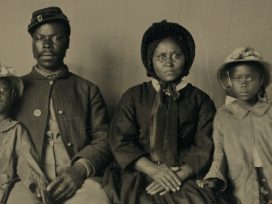When Rick Santorum dropped out of the race for the Republican Party’s presidential nomination, many conservative evangelical voters in the US knew they’d have to throw their weight behind Mitt Romney, who has since won the Republican nomination. Predictably, evangelical leaders immediately began publicly to support Romney – a member of the Church of Jesus Christ of Latter Day Saints, i.e. a Mormon – despite longstanding denominational suspicion of his faith. If their eventual embracing of the candidate came with private rending of garments and gnashing of teeth, many of the more outspoken leaders hid it well in their public statements.
 To be sure, many conservative evangelical leaders point to Romney’s perceived lack of “true” conservative credentials – and not his religion – as their main concern about the candidate. But questions about religion remain, perhaps more for conservative evangelicals than for any other voting bloc. That’s why pastors (many of whom had previously preached against Mormonism) have urged their flocks to support Romney in spite of his Mormonism. At least two prominent Southern Baptist leaders – Richard Land and Robert Jeffress – used those very words.
To be sure, many conservative evangelical leaders point to Romney’s perceived lack of “true” conservative credentials – and not his religion – as their main concern about the candidate. But questions about religion remain, perhaps more for conservative evangelicals than for any other voting bloc. That’s why pastors (many of whom had previously preached against Mormonism) have urged their flocks to support Romney in spite of his Mormonism. At least two prominent Southern Baptist leaders – Richard Land and Robert Jeffress – used those very words.
Reverend Jeffress, of course, is the same megachurch pastor who called Mormonism a “cult” last October, while introducing Rick Perry, his preferred candidate, to the Values Voters Summit. So, how did the message on the man trying to be America’s first Mormon president shift from “cult” to “candidate”? Part of the story is the way both Romney and the evangelicals have been deploying the language of “common ground”.
While some old-school evangelical leaders do not carry the influence they did within the party (Romney’s nomination is good evidence for that), their influence isn’t nearly small enough for Romney to be able to ignore them. Evangelicals still make up a significant portion of the Republican base. Romney has reached out to them by walking a fine line between shared values and different faiths. This approach was out in full force at his May commencement speech at Liberty University, a Christian university in Lynchburg, Virginia founded by the late doyen of the Moral Majority, Jerry Falwell. Speaking to graduates of Liberty, one of the biggest institutional footprints of the old-style political evangelicalism, Romney declared that “marriage is a relationship between one man and one woman”, triggering a standing ovation. As that moment indicates, Romney’s speech focused on perceived common values between those in the crowd and his own beliefs. He then produced another unifying experience: both Mormons and evangelicals, he implied, are made to suffer for their faith. “Our values will not always be the object of public admiration,” Romney declared. “In fact, the more you live by your beliefs, the more you will endure the censure of the world.”
This is a line also taken by evangelical leaders who have to contend with the fact that, according to recent polls, evangelical believers overwhelmingly do not feel that Mormons are “proper” Christians or even substantially similar to them in doctrine. What they can share, goes the political calculation, is a sense of persecution.
Senator Orrin Hatch, a Mormon himself, planted the seed in the national political media when he suggested that Obama’s re-election campaign was “going to throw the Mormon Church at [Romney] like you can’t believe”. Southern Baptist Convention public policy chair Richard Land (who does not endorse candidates) also made statements to reporters indicating that he believed the media would unfairly scrutinise Mormonism in order to swing some voters away from Romney.
When I spoke to Land he told me that he believed the media was already going after Romney’s religion, citing a May New York Times piece on his beliefs as an example. The piece in question certainly scrutinises the values and beliefs of Mormonism through the lens of what we know about Romney’s time in the church. While the piece hardly reads as an attack on Mormonism, the fact that it has been interpreted like that by an evangelical leader suggests they are trying to build common cause grounded in a strong sense of religious persecution.
Christian persecution – always more a complex than a reality in the US – is important to the ways in which many conservative evangelical Christians define themselves against so-called “secular” American culture. Persecution, here, refers more to a sense of discrimination and infringement upon constitutionally protected notions of “religious liberty” than on actual bodily harm or oppressive suffering. It’s similar to David Limbaugh’s usage in Persecution, his 2004 book that infused common conservative assumptions about American universities and the mass media –“hotbeds of liberalism” – with religious terminology.
This idea was played out quite publicly earlier this year over a requirement in the Obama administration’s healthcare reforms that all women should have access to cost-free contraception. Citing “religious liberty”, Catholic and other religious leaders tapped into a notion ever-present in American conservative discourse since the 1970s, arguing that such a policy would prevent many religious people from abiding by their own beliefs. The requirement that employers even indirectly provide contraceptive coverage through an insurance company was re-framed as an attack on all Christian believers.
The contraceptive debate also crystallised the alliance between conservative evangelical and conservative Catholic leaders on social issues that have been becoming progressively less important to many believers (especially younger ones) who otherwise identify as evangelical. During our conversation Richard Land even called former candidate Rick Santorum a “hero” for evangelicals for his stance on social issues. The fact that Santorum is a Catholic, long-time antagonists of conservative Protestants, reveals how unity on a core set of Moral Majority social issues can serve to overcome denominational differences.
Mormons have not, historically, managed to forge such interdenominational alliances, but according to Benjamin Park, a PhD candidate at Cambridge University and a Mormon, it’s not for lack of trying. Park cites the way that Mormons used the California Proposition 8 ballot proposal as an attempt to form an alliance with evangelical groups over social issues. Proposition 8, which passed in 2008, resulted in an amendment to California’s state constitution, defining marriage as exclusively between one man and one woman. The amendment overturned a previous court ruling that had essentially legalised same-sex marriage in the state. The Mormon Church (known acronymically as “LDS”) formally donated over $100,000 to the Proposition 8 campaign, and some reports suggest individual donations to the campaign from Church members topped $5 million. According to Park, LDS leaders had hoped their significant organisational and financial contributions to the “defence” of heterosexual marriage would allow evangelical leaders to see the church as a potential ally on social issues. But, despite their expectations, evangelicals didn’t exactly come running to them with open arms.
Meanwhile, some have started to work against the conservative image of their church. Perhaps learning a lesson from Prop 8, for some Mormons evangelicals look less and less like natural political allies. Park even suggests that liberal Mormons are turning to the “nons” – those in the US who do not identify as religious – as potential sociopolitical allies. This June in Salt Lake City, Utah, more than 300 straight, faithful Mormons marched in a gay pride parade, with plans to participate in other marches around the country.
But efforts for a Liberal Mormon rebrand are likely to have only limited success. According to polls Mormons remain an ideal fit with the Republican Party. In an extensive Pew study of self-identified Mormons released earlier this year, two-thirds of Mormons identify as politically conservative, while three-quarters support the Republicans (by comparison, about 37 per cent of Americans overall identify as conservative). Though there are some prominent Mormon “liberals” – like Harry Reid, a Democratic Senator from Nevada – their voice is not as loud as that of Mormon arch-conservatives like former Fox News commentator Glenn Beck, who now owns his own broadcasting network.
Despite the negative associations many evangelicals have about Mormonism, Richard Land told me that for some evangelical voters “[Romney] hasn’t been Mormon enough.” In Land’s view Romney has failed to exploit the fact that the church officially holds views, like its anti-choice and anti-same-sex-marriage agenda, that are consistent with the evangelical agenda. The problem is that Romney has a history of “flip flopping” on both issues. Land and other conservative evangelicals have tried to downplay the possibility that evangelical Christians won’t vote for Romney because of a perception that Mormonism is heretical, and talk up the common ground between all Christians, but Land admitted to me that this will have limited effect on a hardcore of evangelicals who can’t bring themselves to vote for a Mormon, no matter what.
That’s nothing new for public attitudes towards Mormons, whose complaints about persecution are not merely self-serving paranoia but grounded in a genuine history of discrimination. The nineteenth century saw a good deal of criticism of the Church founded by Joseph Smith in 1830, as well as periodic instances of violence against his followers. In 1838, following a skirmish which has become known as the “Missouri Mormon Wars”, then Governor of Missouri Lilburn Boggs, in a statement known within the Church as “The Mormon Extermination Order”, declared Mormons to be enemies of the state. As many as 10,000 Mormons were stripped of their property and expelled from Missouri. There were also “Mormon Wars” in Utah and Illinois. This history, according to Park, remains an important part of the Mormon identity. It’s even in the hymns: one, called “Praise to the Man”, focuses on the violent death of Joseph Smith. “Praise to his memory, he died as a martyr; Honored and blest be his ever great name!” It goes on: “Sacrifice brings forth the blessings of heaven; Earth must atone for the blood of that man. Wake up the world for the conflict of justice. Millions shall know Brother Joseph again.”
The interest sparked by Romney’s candidacy has – at least according to the US media – sparked a “Mormon moment”. But one of the bigger lessons learned from the moment might be that Americans know little about Mormonism, and probably aren’t interested in learning more. “We have a Mormon moment about every five years,” Park told me, yet none of these moments have led to any fundamental shifts in the “outsider” religion’s relationship to the American mainstream.
But that could still change. It remains up in the air whether Mormonism, or religion at all, will become a major issue in November’s Presidential election. Neither do we know how the message of evangelical leaders will be received by the suspicious evangelical flock. A week after I spoke to Land he was stripped of his popular radio show following an investigation into his use of an unattributed newspaper column, during a segment in which he accused President Obama of exploiting the shooting of black teenager Trayvon Martin for political capital. A church panel also censured Land for “racial insensitivity”. But though he has been humiliated and forced to apologise, he has kept his job as senior policy spokesman for the Southern Baptist Convention. Neither he nor evangelical conservatives more generally are yet a spent force, and how they break on Romney still has a chance of deciding the election.
In the end, as Land told me, it may come down not to a vote for Romney but to a vote against Obama. Though Obama’s powerful communications director David Axelrod has pledged not to go there with Romney’s beliefs, and Romney has distanced himself from a proposed attack ad campaign highlighting Obama’s links to the controversial pastor Jeremiah Wright, this may all change as the election temperature rises, and in any case it may not ultimately be in the candidates’ control. The 2012 campaigns in the US have been heavily marked by the influence of “Super PACs” – independently funded “political action committees” which focus on specific political targets with often devastating effect. As of February 313 Super-PACs had already spent $50 million across a variety of election campaigns, with at least as much again sitting in their war chests. While the main combatants of both sides might think it too politically risky to raise the spectre of religion as an election issue, the Super-PACs are likely to show no such delicacy. Religion, then, might dominate the election as a negative force. But Republicans – both evangelical and Mormon – are hoping it might play a more positive role, galvanising believers of all stripes to vote en masse against what Newt Gingrich called Obama’s “secular-socialist machine”. They are hoping that Romney can somehow turn his Mormon moment into some serious Mormon momentum.






